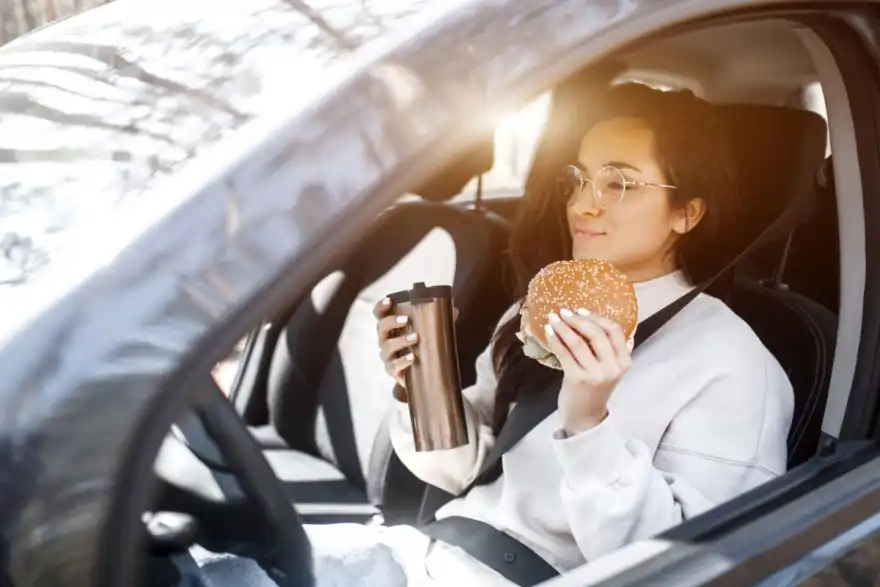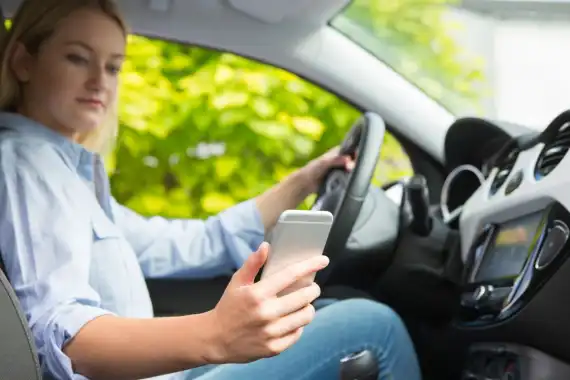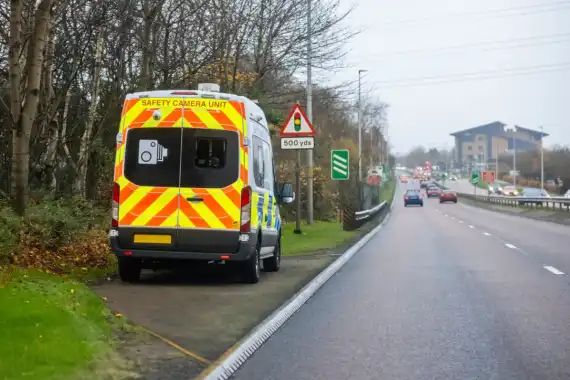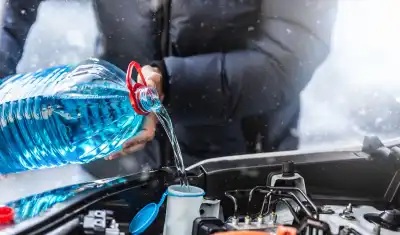
There are many myths about driving. But now, you can rest easy or settle arguments because we have the definitive answers to some common questions.
Is it illegal to eat and drive?
It's not against the law to eat while driving. However, if eating makes you a danger on the road, the police could prosecute you for careless driving and for not being in full control of your vehicle.
Research from Leeds University revealed that drivers who eat while behind the wheel are actually 44% slower than usual...
Is it illegal to drink when driving?
Just like eating, drinking while driving isn't against the law, but it can result in the same careless driving consequences. The Leeds University study also discovered that drivers who took a sip while driving were 22% slower and 18% more likely to veer erratically between lanes.
Is smoking while driving illegal?
Smoking while driving isn't illegal by itself, but if it causes careless driving, you could face legal consequences.
However, smoking in a car with passengers under 18 became illegal in England on the 1st October 2015.
Yet, enforcement of this law remains controversial. Despite health advocates supporting the legislation, a Freedom of Information request last year revealed that most police forces aren't actively enforcing it.
Is it illegal to have a light on in a car while driving?
There's no specific law against it. But if a police officer thinks your interior light is distracting, they can ask you to switch it off when they pull you over.
Is it illegal to have open alcohol in a car?
No, it's not illegal in England for a passenger to drink while in a car. Therefore, having open alcohol containers in a car is not automatically illegal.
The only alcohol-related laws concerning driving in the UK are the drink-driving laws, which dictate that drivers can only operate a vehicle if they're under the national drink-drive limit.
However, it is against the law to consume alcohol in a car while supervising a learner driver.
Is it illegal to drive with headphones on?
There isn't a specific law that outright bans driving while wearing headphones. However, it's strongly discouraged and could be considered driving without due care and attention or careless driving if a police officer sees it that way.
Listening to very loud music through headphones can be extremely distracting and might prevent you from hearing important traffic signals or emergency sirens.

Is it ok to make a phone call using a hands-free system?
Using a hand-held mobile phone while driving is against the law and can lead to six points on your licence and a £200 fine. However, it's not illegal to have a conversation using a hands-free mobile phone.
Voice-controlled Bluetooth systems eliminate the need to touch your phone. But if you have to handle your phone to make a call, it breaks the law, even with headphones.
In October 2020, the Government announced plans to close this outdated loophole and prohibit drivers from picking up their phone for any reason while driving.
Mobile phone distractions pose a serious risk on the roads and caused 43 fatalities in 2017.
Therefore, make sure any hands-free devices are fully set up before you drive, allowing you to take calls without handling the device.
Police still have the authority to pull you over if they suspect you've been distracted by using a mobile phone while driving, even if it's entirely hands-free.
What are the rules on driving with a sat nav?
Satellite navigation systems must be securely placed in a fixed position, either on your windscreen or dashboard. It's best to place it on your dashboard to avoid obstructing your view. If you're using your phone for navigation, it's advisable to use a phone holder attached to your dashboard for the same reason.
Similar to handheld phones, you shouldn't interact with your phone while using it as a sat-nav while driving, as it could result in six penalty points on your license and a £200 fine if caught.
Are women better drivers than men?
A study by moneysupermarket.com on driving behaviours in rental cars found that female drivers exceed the speed limit 17.5% more often than men. However, males are five times more likely to cause damage to a rental car than female motorists.
Data from an NCP survey also indicated that women are more proficient at parking than male drivers, scoring an average of 13.4 out of 20 for manoeuvring compared to 12.3 for men.
Ultimately, without a comprehensive study that thoroughly examines all driving factors, it's impossible to determine which gender is inherently better at driving. There may be genetic factors yet to be discovered, but currently, driving ability seems to be more about the individual's skills rather than their gender.

If a speed camera doesn’t flash does it mean I’ve not been caught?
There are various types of speed cameras, but only the Gatso type flashes to capture your speeding. Others detect speed using infrared light as you approach the unit.
Remember, even if there's no flash, it doesn't guarantee you won't get convicted. The simplest way to avoid being caught speeding is to always stick to the speed limits.
Are you allowed to drive 10 percent over the speed limit?
No, even though many speedometers allow for a 10% overestimation error (but not underestimation), it doesn't give you the green light to drive at 33mph in a 30mph zone.
In simple terms, if a police officer catches you exceeding the speed limit with a mobile radar speed gun, even by just 1mph, you can still be prosecuted.
The National Police Chiefs’ Council (NPCC) recommends that police forces don't usually prosecute unless drivers exceed a margin of error of 10% of the speed limit plus 2mph for speedometer error, considering driver focus.
However, this is just a suggestion, as they don't have the authority to enforce the law. Ultimately, the level of discretion a police officer decides to use is up to them.
How many drinks can I have and still drive?
It's often believed that men can handle 'a pint or two' and women a large glass of wine and still drive safely afterwards.
However, your blood-alcohol level is influenced by numerous factors beyond just the drinks you've consumed. Factors like eating, physical activity, fatigue, and medication intake can all impact how your body metabolises alcohol.
Considering these various factors, there's no straightforward rule. For further guidance on this issue, refer to our comprehensive guide on drink-driving limits.
Ultimately, the safest advice is to avoid consuming any alcohol if you're planning to drive.
Does my fully-comprehensive insurance policy cover me to drive other cars?
In most instances, provided you have the owner's permission, you can drive another car with insurance. However, there are exceptions.
If you're under 25, have specific prior driving convictions, or if the car is unusual, you might not be covered.
It's wise to review your own car insurance policy before driving another vehicle. It should detail your coverage and any conditions. If unsure, contact your insurance provider for clarification.




